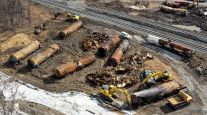Senior Reporter
House Panel Advances FEMA Relief Bill

[Stay on top of transportation news: Get TTNews in your inbox.]
Legislation that would adjust the cost share of federal disaster assistance recently was approved by the House transportation committee.
The bill would adjust certain Federal Emergency Management Agency cost shares declared this year to not less than 90% federal and 10% nonfederal.
The FEMA Assistance Relief Act of 2020 also would adjust the agency’s cost share for COVID-19-related emergencies and major disaster declarations to 100%. It would clarify Congress’ expectation of FEMA covering certain costs related to personal protective equipment, schools, transit and courthouses.
The legislation, approved Sept. 30, advanced to the floor of the chamber.
“This bill would increase the federal cost share of disaster and emergency relief, easing financial burdens on communities across the nation — like my district in southwest Oregon — that are facing dual crises of the COVID-19 pandemic and natural disasters,” said Transportation and Infrastructure Committee Chairman Peter DeFazio (D-Ore.), emphasizing the goal of assisting state agencies responding to natural disasters.
The chairman’s colleagues echoed his sentiment. Economic Development, Public Buildings and Emergency Management Subcommittee Chairwoman Dina Titus (D-Nev.) observed, “Communities across the West and all around the country are facing unprecedented challenges from wildfires, floods and hurricanes while combating a global pandemic and a severe economic crisis.”
“The toll of this pandemic, compounded by natural disasters across the country, is unprecedented, but FEMA taking on a greater share of emergency response costs is not,” added Rep. Nita Lowey (D-N.Y.), chairwoman of the Appropriations Committee and a co-sponsor. “Our state and local governments have been on the front lines working to respond to the health and economic impact of the pandemic, and they have been in dire need of additional resources and support to weather this crisis.”

Lowey
Transportation and Infrastructure Committee ranking member Sam Graves (R-Mo.) supported his colleagues in advancing the legislation, which he said would “help improve FEMA’s coordination with states and local governments in getting disaster relief to those who need it.”
Earlier this year, senior Democrats called on the White House to order that agencies develop contingency plans during the pandemic pertaining to severe-weather events, such as storms and floods. The lawmakers also noted such plans need to utilize the Robert T. Stafford Disaster Relief and Emergency Assistance Act and the Defense Production Act.
“We request the White House order all appropriate federal agencies to create contingency and surge plans for how to support communities in the case of a compound threat scenario,” Reps. DeFazio, Frank Pallone of New Jersey and Eddie Bernice Johnson of Texas — each the chairman of a committee — wrote to Vice President Mike Pence on July 16.

Graves
FEMA’s leadership emphasized the agency has been collaborating with federal agencies and state, local, tribal and territorial agencies to address concerns and challenges related to the COVID-19 pandemic. Major disaster declarations were issued for the states, the District of Columbia and four territories. Also, FEMA indicated it is working with 32 tribes to provide assistance.
Earlier this year, FEMA published a policy notice outlining its Building Resilience Infrastructures and Communities, or BRIC, grants. Established in 2018 after the enactment of the Disaster Recovery Reform Act, BRIC is designed to incentivize innovative infrastructure projects capable of withstanding severe weather events.
According to the notice in the Federal Register, “The new program would supersede the existing Pre-Disaster Mitigation grant program and would promote a national culture of preparedness through encouraging investments to protect communities and infrastructure and strengthening national mitigation capabilities to foster resilience.”
Want more news? Listen to today's daily briefing:
Subscribe: Apple Podcasts | Spotify | Amazon Alexa | Google Assistant | More




